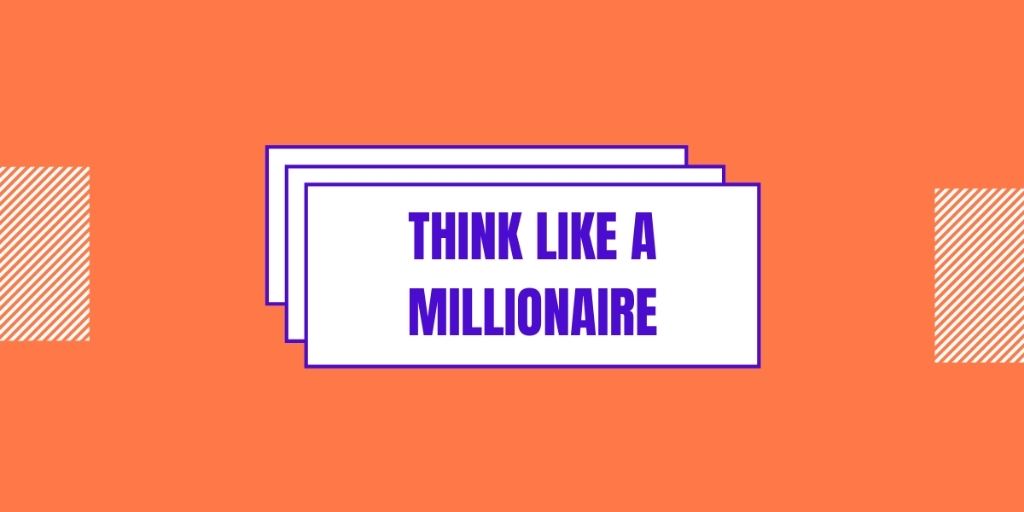How to Think Like a Self-Made Millionaire? For the longest time, my family taught me to go to school, then college, and then get an excellent job as an employee for a stable employer. “Become a doctor,” they advised. “Become a lawyer,” they declared. They demanded, “Get one with good benefits and a retirement plan.” My grandmother was so insistent that I attend a good university that my graduation from the University of California, Santa Barbara outweighed all of the other accomplishments that I thought were much greater than getting a degree.
What’s with the obsession with going to college, getting a degree, and finding a stable job? I believe it is an old-school fear-based mentality. The second tier of Maslow’s Hierarchy of Needs addresses a person’s innate need for safety and security. In our caveman days, security meant finding a cave that kept saber-toothed tigers out. It now denotes financial security. You see, there was very little financial security in my Grandma’s day. She has lived through five U.S. wars, was wrongfully imprisoned by the American government during World War II because she was Japanese-American, endured the Great Depression of the 1930s, and dealt with the 1987 stock market crash known as “Black Monday.” Empathizing with her situation, I can see how she would value a high education and a stable job over anything else because anything else would be too unstable in her mind. I got my degree and made her happy, but I didn’t want to trade my time for money and have someone else control my freedom and the amount of money I could make.
Myth: Formal education will result in tremendous financial success.
(Additional: How to be successful without college?)
I coasted through college with no intense studying or desire to study. In terms of study habits, I was a terrible student. I attribute my success in college solely to my natural ability to select the correct multiple-choice answers based on deductive reasoning and my passion for writing research papers. But the entire time I was there, I was looking for information that I could take to the streets—practical information that I could use; after all, I had paid tens of thousands of dollars for my top-tier education. Nonetheless, I completed my college education with perhaps only three classes that provided me with helpful information.
As many recent college graduates have discovered, when you graduate, you enter a business world that is less concerned with education and more concerned with marketable trade-specific skills. So there I was, holding my diploma, learning that I was no better off than a high school graduate. I was at a disadvantage compared to those who had entered the workforce straight out of high school because they had worked their way up and gained marketable experience and skill sets that employers valued. I felt duped because I had been told my entire life that if I graduated from college, the money would be waiting for me.
The truth may be painful, but the record must be set straight, and that is that employees with a four-year degree are a dime a dozen in this day and age. As an employer, I can tell you that a four-year education tells me you can read and write well, but not much else. Experience and practical knowledge are what I look for. I’m not saying a four-year degree is worthless, but its weight on the career bargaining table isn’t what it used to be. To put it another way, attending college will make you a good employee, but it will not guarantee you wealth.

Table of Contents
How to Think Like a Self-Made Millionaire – The Employee Salary Dilemma
Getting a corporate salary is the most significant impediment to wealth creation if you use it as your sole source of wealth. That’s because, for most of us, our pay is fixed by our employers, and they dictate any raises. In short, we won’t get rich unless our boss says so. Unfortunately, I have yet to meet a single employer who has decided to make their employee wealthy. Being on salary is stable, and people enjoy being harsh, but to develop a millionaire mindset, you must stop viewing your salary as the only source of income. Being a salaried employee is not necessarily a bad thing. You can use your experience to learn and acquire new skills while also having a steady source of income to pay your bills. I’m just saying that you shouldn’t rely solely on your salary if you want to become wealthy because, at best, your employer will allow you to make a decent living, not become rich.
Self-Employed vs. Business-Ownership
Private practice doctors, lawyers, and other similar high-paying service professions make a good living, but they aren’t what I consider wealthy solely because of their jobs. Even though their hourly wage is higher than the average, their wealth framework is the same as that of the gardener earning only $8.00 per hour—they are still trading their time for money.
What’s the problem with that? Because we only have a certain amount of time in the day to monetize. Granted, these professionals have escaped corporate tyranny, but they now face a new challenge: not working equals no income. That means that if these people are out sick, on vacation, or injured, their entire source of income disappears because they can’t trade their time for money. This puts a lot of pressure on these people to stay busy, which is why I think lawyers are the most nervous people I know. That brings me to my next point: being self-employed entails trading time for money, whereas being a business owner entails utilizing the power of leverage.
How to Think Like a Self-Made Millionaire Continued
What exactly is leverage?
Business owners are the wealthiest people globally, and many do not have a formal college education. Bill Gates, the founder of Microsoft, is a good example, with a net worth of approximately $25 billion. He dropped out of Harvard to start his own business. Business owners use the power of leverage, which means that they get more out of their one hour than self-employed people or employees. In the case of Gates, he created a computer operating system that he licensed out. He worked hard to create one product that provided a lot of value to its buyers, and he profited greatly as a result.
But you don’t have to write software to be as wealthy as Bill Gates. Real estate investors follow the same passive income model. Those who invest do the same thing. In the service industry, innovative service professionals begin contracting others to provide essential services while taking a profit cut, creating value for both the service provider and the customer. That is service leveraging.
Business owners seek multiple sources of income. Employees believe they have a level of security in their job, but a surprise layoff or termination could end that security as quickly as it was gained. Worse, the employee has nothing but unemployment benefits to rely on. A business owner may lose one of his revenue streams, but he still has others to rely on. Having multiple streams of income is what I consider to be safe.
How to Think Like a Self-Made Millionaire – Take a Chance
In my Development sessions, I encourage people to face their fears head-on because doing so allows them to grow personally and professionally. Entrepreneurs and employees must deal with failures, but savvy entrepreneurs aren’t afraid to take that risk because they know it will bring them one step closer to success. Be open to new ideas and think outside the box. Look for new ways to make money, and don’t just talk about it; DO IT. The ability to act is one of the most powerful concepts that make people millionaires.
How to Think Like a Self-Made Millionaire – Important Points
While this article only briefly discusses the millionaire mindset, keep the following key points in mind:
- We all have the same amount of time in a day, and we can only sell so much of it.
- If you trade your time for money, the best you can hope for is to make a living. This model will not make you wealthy.
- Find ways to leverage what you do to get more out of your time and thus more money.
- Create multiple income streams by creating passive income through products, software, or investment vehicles that generate a positive cash flow.
- Please don’t wait for the ideal moment because it will never come. Act now, even if your plan isn’t flawless.
That’s all about – How to Think Like a Self-Made Millionaire.






